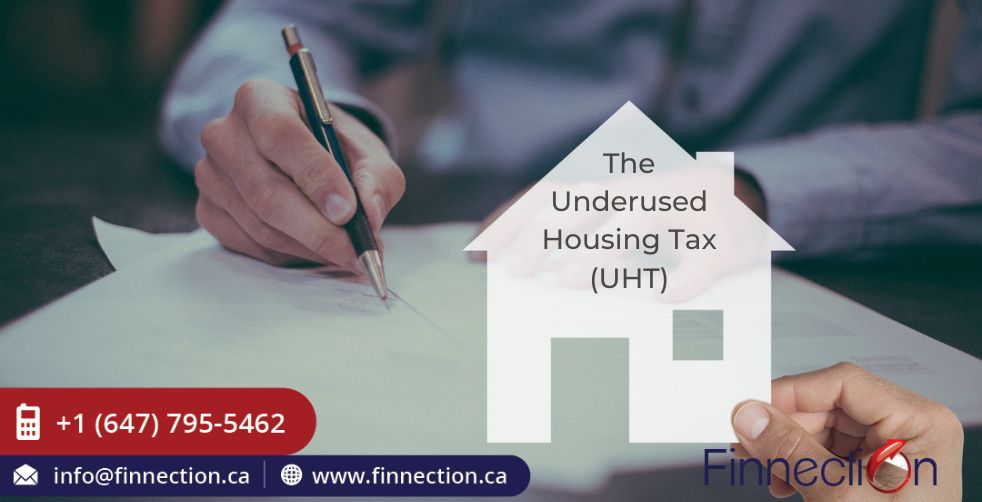In January 2022, the government introduced an unused housing tax in an attempt to reduce the level of property speculation and restraint foreign housing investment. This tax affects homeowners with vacant or underutilized homes who must file an annual UHT return with the Canada Revenue Agency (CRA).

WHAT IS THE UHT?
- UHT is intended to apply to underused housing in Canada owned directly or indirectly in whole or in part by non-residents, non-Canadian persons.
- The UHT Regulation divides homeowners into three broad groups.
- Owners who are not UHT reporting or taxable (referred to as “excluded owners” in UHT law).
- The owner must file her UHT declaration and pay taxes (referred to as an “affected owner” in CRA guidance).
- A tax-exempt owner who must file a UHT (also known as an “affected owner”).
- A tax-exempt owner who must file a UHT (also known as an “affected owner”)
Properties Affected:
Properties affected by this tax are:
- Semi-detached houses, townhouse units, condominiums, or other similar buildings and all common areas, fixtures, and related grounds
- Single-family homes or similar buildings with no more than three dwelling units, including al accessories and associated land.
Which owners are excluded?
- Excluded Owners who are exempt from UHT obligations are as follows (as of December 31st of the calendar year):An individual Canadian citizen or permanent resident2 of Canada (“Canadian”), unless exempted as an owner in his capacity as a trustee or partner (other than a personal representative of the deceased)
- Canadian public company
- Owners who qualify as trustees of mutual funds, real estate investment trusts, and special investment flow-through trusts (SIFTs)
- Registered Charity
- Housing cooperative
- Municipalities and other public institutions and public offices
- Indigenous Governing Body or Corporation
- “Designated person” (not yet defined by regulation at time of writing)
Which owners are Affected?
Affected homeowners who must file returns and pay taxes include:
- A Canadian citizen or permanent resident who owns residential property as trustee of a trust (other than a deceased trust)
- Anyone, including Canadian citizens and permanent residents, who owns residential property as part of a partnership.
- Corporations incorporated outside of Canada.
- Company with no share capital (non-profit)
Which owners are required to file a UHT return but are tax exempt?
This subset of affected owners typically qualifies for one of the available exemptions, but must file an annual return to claim the calendar year exemption.
Who Does Not Have to Pay Underused Housing Tax (UHT)?
- Exemption by Ownership
- Exemption by Availability of Property
- Exemption by Occupant of the Property
- Exemption by Location of the Property
Calculate Underused Housing Tax (UHT)
UHT is 1% of the greater of:
- The assessed value of the property for the year for property tax purposes. And
- The latest selling price applied to the ownership percentage.
Calculating the Tax
If you do not meet any of the exemption criteria and are required to file a return and pay tax, the amount of tax payable is determined as follows:
- 1% of the assessed value of the property. (Estimate based on property tax assessment)
- If there is no (1), 1% of the market value of the property. I need a professional opinion.
Penalty for late filing of Underused Housing Tax (UHT) Return
Individual owners who fail to file their returns by the deadline will be fined a minimum of $5,000, and legal entities will be fined a minimum of $10,000. This penalty applies even if you have $0 unused housing tax.
Taxes on unused homeownership are very complex and the law is relatively new. If you have questions or are unsure about potential exemptions or reporting requirements, please contact us.
We will help you determine your responsibilities and file the required declarations on your behalf.
If you have any questions regarding housing taxes, feel free to contact finnection via email at info@finnection.ca or call us at (647) 795-5462
Disclaimer: Above information is subject to change and represent the views of the author. It is shared for educational purposes only. Readers are advised to use their own judgement and seek specific professional advice before making any decision. Finnection Inc. is not liable for any actions taken by reader based on the information shared in this article. You may consult with us before using this information for any purpose.
